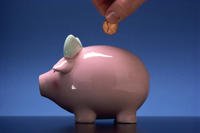If you're like most people, you probably picked your current bank because of its location and the fact that it offered you a low minimum balance with no monthly fee.
But not all banks are alike. That's why it's important to shop around if you're looking for a place to deposit your hard-earned dollars. Knowing what to look for can help you save money on what it costs to bank.
Banking Choices
You shouldn't limit yourself to just banks if you're simply looking for a checking or savings account. There are other financial institutions that provide similar services.
- Commercial Banks
- Saving and Loans
- Credit Unions
- Private Banks
- Mutual Funds
- Brokerage Houses
- Insurance Companies
What Do You Need?
Here are some things to consider:
- What kinds of transactions will you need to make?
- How much money will you keep in the account?
- How many checks do you plan to write a month?
- How much are you willing to deposit to have access to more services?
- What time of day do you normally go to the bank?
- Do you prefer the convenience of an ATM or would you rather bank in person?
Features to Compare
When shopping for a checking or savings account, it's important that you compare features. It pays to know the difference between accounts.
Look closely for some of the following features:
- Services
What selection of products does the bank offer?- Holiday club savings
- Senior accounts
- Checking, savings, or money market accounts
- Investment services
- Insurance products
- Do the bank's employees seem friendly and helpful?
- Do you feel comfortable in the bank's surroundings?
- Convenience
- Does the bank offer online services?
- How many branches does the bank have?
- How close is their nearest branch to your home? Your work?
- How many ATMs are in the bank's network?
- Are the bank's hours flexible enough for your schedule?
- Are their branches co-located in convenient spots like supermarkets or malls?
- Size
- Do you want a small neighborhood bank where you'll more likely to be remembered?
- Are you willing to forego lower costs for better service?
- In terms of service, how do large banks compare with smaller ones in your local area?
- Fees
- Are there flat fees for checking?
- Is there a fee if your balance drops below a preset level?
- ATM usage fee? Fee for using ATMs outside of the banks network?
- Balance inquiries
- Per-check fees
- Overdraft protection
- Bounced checks
- Canceled checks
- Closing your account
- Are any fees waived if you set up a direct deposit with your paycheck?
- Are any fees reduced if you open up more than one account with the same bank?
- Loan application processing
- Safe deposit box rental
- Debit card use
- Check fees
- Rates
- What is the current interest rate?
- Are rates based on the level of your account balance?
- How often is interest compounded?
- What balance is required to start earning interest?
- When does the interest begin accruing? When you deposit money or when the check clears?
- What is the Annual Percentage Yield (APY)?
- FDIC
Look for banks that are insured by the Federal Deposit Insurance Corporation (FDIC). The government protects your money for up to $100,000 in losses. Ask the bank what FDIC rules will apply to your account. Look for a bank's Member FDIC sticker.
Opening an Account
What you need to open an account:
- Valid Identification
You should bring a valid I.D. such as a driver's license, social security card, birth certificate, or passport.
- Social Security Number
Banks require you to provide a social security number to open an account -- for tax purposes.
- Signature Card
You must sign a signature card so the bank can identify your handwriting on future checks, deposits, or other banking services.
- Application
The application tells the bank what type of account you're going to open (joint, individual, etc.). You'll have to list important information such as full name, address, phone number and other personal information.
- Initial Deposit
Most banks require you to make a minimum intial deposit to open a bank account.
- Direct Deposit Form
You have to fill this form out if you want your paycheck to be automatically deposited to your new account. You'll also have to notify the company for which you work -- so they can complete the appropriate paperwork.









